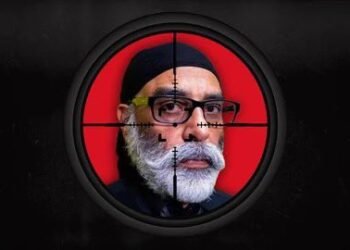In a groundbreaking move, the United States has lifted a $10 million bounty on Ahmed al-Sharaa, leader of Hayat Tahrir al-Sham (HTS), to facilitate dialogue on Syria’s future. This decision follows the first direct meeting between U.S. diplomats and HTS leadership, where discussions addressed regional security, the fight against Islamic State (IS), and the status of missing Americans, including journalist Austin Tice.
By PC Bureau
The United States has lifted a $10 million bounty on Ahmed al-Sharaa, the leader of Hayat Tahrir al-Sham (HTS), signaling a shift in its approach to post-Assad Syria. This development follows the first direct meeting between U.S. diplomats and HTS leadership in Damascus, where discussions centered on stabilizing the region and addressing ongoing security challenges.
Sharaa, formerly known by his nom de guerre Abu Mohammed al-Jolani, assured American officials that his group would not allow Islamic State (IS) or other terrorist organizations to operate within HTS-controlled territories. Barbara Leaf, the State Department’s senior Middle East diplomat, explained that the removal of the bounty was a pragmatic decision to enable productive dialogue. “If we’re engaging in detailed discussions about U.S. and regional interests, it’s incoherent to maintain a bounty on the individual we’re talking to,” she said.
#BREAKING: US will no longer be pursuing $10M Rewards for Justice bounty on Syrian HTS' leader Ahmed al Sharaa – US top diplomat Barbara Leaf pic.twitter.com/1rlFMXq2qJ
— TRT World (@trtworld) December 20, 2024
Missing Americans and Regional Security
The U.S. delegation, which included Roger Carstens, the presidential envoy for hostage affairs, and senior adviser Daniel Rubinstein, raised the issue of missing Americans, including journalist Austin Tice, who disappeared in Syria in 2012, and Majd Kamalmaz, a Syrian-American psychotherapist. Leaf emphasized the U.S. commitment to locating these individuals, noting, “We’ve identified six facilities where Austin Tice may have been held and are working with allies, NGOs, and even media organizations to investigate.”
https://x.com/conflict_live/status/1870289343233016023
The Kurdish Question and U.S.-Turkey Relations
The future of Syria’s Kurds, longstanding U.S. allies in the fight against IS, was also a key topic. The Kurdish-led Syrian Democratic Forces (SDF), backed by the U.S., remain a point of contention with Turkey, which views the group as an extension of the Kurdistan Workers’ Party (PKK), a designated terrorist organization. Turkish President Recep Tayyip Erdoğan has reiterated his demand for an end to international support for Kurdish militias, stating, “The heads of terrorist organizations like IS and PKK-YPG will be crushed in the shortest time.”
To navigate this delicate situation, Leaf revealed ongoing U.S. efforts to mediate between Turkey and the SDF, seeking a managed transition in northern Syria. “We are working energetically with Turkish authorities and the SDF to de-escalate tensions and ensure the critical counter-IS mission is not disrupted,” she said.
Military Presence and Strategic Interests
The Pentagon recently disclosed that it has 2,000 troops in Syria, more than double previous estimates. While the Defense Department described this as a temporary surge, it underscores the complexity of the U.S. role in the region. President-elect Donald Trump, who has consistently questioned U.S. involvement in Syria, has signaled his desire to reduce the American footprint. “This is not our fight,” he said recently on social media, reiterating his long-standing position that U.S. forces should not be entangled in Middle Eastern conflicts.
The Broader Context of Syrian Conflict
The talks in Damascus come at a pivotal moment for Syria. With the fall of Bashar al-Assad’s regime earlier this month, regional power dynamics are rapidly evolving. Iran’s influence in Syria remains a concern for Washington, which is advocating for a sovereign Syria free from Tehran’s control. “What our government would like to see is a Syria that can stand on its own two feet, much like Iraq has regained sovereignty,” Leaf said.
Meanwhile, the humanitarian crisis in the region continues to worsen. The ongoing conflict in Gaza has drawn international attention, with over 45,000 Palestinian casualties reported. Efforts to broker a ceasefire remain elusive, as the Biden administration works to address overlapping crises across the Middle East.
Path Forward
The U.S. engagement with HTS and its broader diplomatic efforts in Syria reflect a nuanced approach to stabilizing a region fraught with challenges. By addressing security concerns, advocating for missing Americans, and mediating between conflicting parties, Washington aims to recalibrate its strategy in post-Assad Syria. However, the path forward is fraught with obstacles, including Turkey’s opposition to Kurdish forces, the remnants of IS, and the complex dynamics of regional power struggles.














